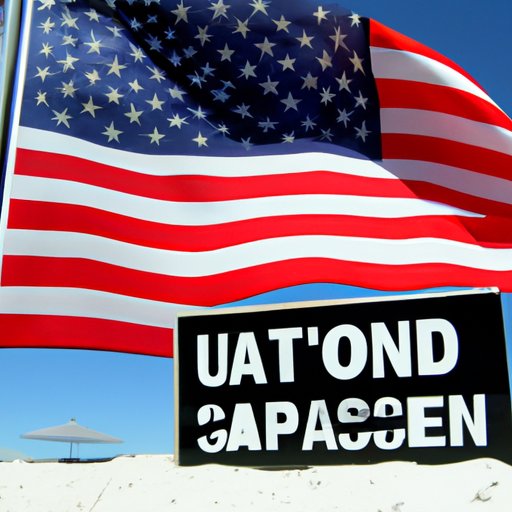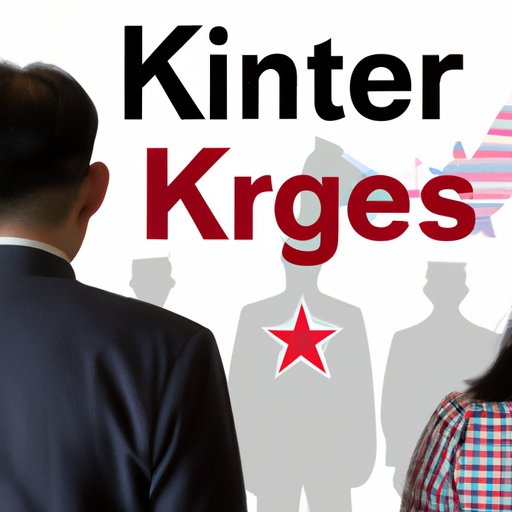Overview of U.S. Citizens Traveling to North Korea
North Korea is a country with a long and turbulent history, which has made it one of the least-visited countries in the world. Despite this, some U.S. citizens have decided to take the plunge and visit North Korea, despite the political tensions between the two countries. In this article, we will explore the legalities, safety, and cultural considerations of U.S. citizens traveling to North Korea.
History of U.S./North Korea Relations
The United States and North Korea have had a tumultuous relationship since the end of the Korean War in 1953. In recent years, the relationship has become increasingly strained due to North Korea’s nuclear ambitions and its human rights abuses. This has resulted in the United States imposing numerous sanctions on North Korea, including a ban on U.S. citizens traveling to the country.

Current U.S. Sanctions on North Korea
The United States has imposed a wide range of sanctions on North Korea, including a ban on U.S. citizens traveling to the country. According to the U.S. Department of the Treasury, “U.S. persons are generally prohibited from engaging in transactions or dealings with North Korea.” This includes all forms of travel, including tourism, business trips, and educational visits.

Exceptions to U.S. Sanctions for Tourists
Despite the general prohibition on U.S. citizens traveling to North Korea, there are some exceptions. For example, the U.S. Department of State allows U.S. citizens to apply for a special validation license if they wish to travel to North Korea for humanitarian, journalistic, or religious activities. The license must be obtained prior to any travel to North Korea.
Legalities and Regulations Surrounding U.S. Citizens Visiting North Korea
Before traveling to North Korea, U.S. citizens should familiarize themselves with the legalities and regulations surrounding their visit. These include obtaining a visa, providing the necessary documentation, and understanding the restrictions on activities.
Obtaining a Visa
All visitors to North Korea must obtain a visa prior to their arrival. U.S. citizens can apply for a visa through North Korean diplomatic missions abroad, as well as through authorized travel agencies. It is important to note that the visa application process can take several weeks, so travelers should plan accordingly.
Required Documentation
In addition to a valid passport, U.S. citizens must provide proof of medical insurance and a letter of invitation from a North Korean government agency or tour operator. They must also provide detailed information about their proposed itinerary, including the dates and locations of their planned activities.
Restrictions on Activities
U.S. citizens should be aware that North Korea has strict rules regarding the activities of foreign visitors. Tourists are not allowed to leave their designated hotels without permission, and they must be accompanied by a guide at all times. Furthermore, photography is strictly regulated and visitors should not take pictures of military installations or personnel.
Safety Concerns of Tourists Visiting North Korea
When considering whether to visit North Korea, U.S. citizens should be aware of the safety concerns associated with traveling to the country. These include the political climate, health and hygiene standards, and security issues.
Political Climate
The political climate in North Korea is tense, and U.S. citizens may find themselves subject to heightened scrutiny. Visitors should be aware that North Korean authorities are likely to monitor their movements and activities while in the country. They should also be aware that they could potentially face arrest or detention if they engage in activities deemed to be subversive or critical of the North Korean government.
Health and Hygiene Standards
North Korea has limited access to medical care, and travelers may find that the health and hygiene standards in the country are lower than those in the United States. As such, it is important for visitors to take precautions to protect themselves from illnesses, such as avoiding tap water and eating only cooked food.
Security Issues
Due to the volatile political situation in North Korea, travelers should be aware of the potential security risks. This includes being aware of their surroundings at all times, avoiding large crowds and demonstrations, and not engaging in conversations about sensitive political topics.
Economic Impact of U.S. Citizens Visiting North Korea
The economic impact of U.S. citizens visiting North Korea is significant. This includes the foreign currency exchange, tourism revenue, and international trade.
Foreign Currency Exchange
U.S. citizens traveling to North Korea must exchange their dollars for North Korean won. This has a positive impact on North Korea’s economy, as it increases the amount of foreign currency available to the country.
Tourism Revenue
Tourism is an important source of income for North Korea, and U.S. citizens visiting the country contribute significantly to this revenue. According to a report by the Korea Maritime Institute, U.S. tourists spent an estimated $25 million in North Korea in 2017.
International Trade
U.S. citizens visiting North Korea can help to facilitate international trade between the two countries. By opening up channels of communication, U.S. citizens can help to foster better relations between the two countries and potentially lead to increased trade and investment opportunities.

Cultural Differences Between North Korea and the U.S.
When traveling to North Korea, U.S. citizens should be aware of the cultural differences between the two countries. This includes language, religion, and social customs.
Language
The official language of North Korea is Korean, and most signs and announcements are written in Korean. U.S. citizens should be aware that English is not widely spoken in North Korea, and they should make sure to bring a translation dictionary or phrasebook with them.
Religion
North Korea is officially an atheist state, and religious activity is heavily restricted. U.S. citizens should be aware that public displays of religion, such as praying or wearing religious symbols, are not tolerated in North Korea.
Social Customs
U.S. citizens should also be aware of the different social customs in North Korea. For example, visitors should avoid discussing sensitive political topics, and they should treat all images of the North Korean leadership with respect.

Potential Benefits of U.S. Citizens Visiting North Korea
Despite the risks involved, U.S. citizens visiting North Korea can gain a unique insight into the culture and politics of the country. This can lead to greater cultural understanding, personal insight, and diplomatic opportunities.
Cultural Understanding
Traveling to North Korea can help U.S. citizens to gain a better understanding of the country’s culture and people. This can help to foster greater understanding between the two countries and potentially lead to improved relations.
Personal Insight
Visiting North Korea can also provide a valuable personal insight into the country. U.S. citizens can gain a firsthand experience of life in North Korea, which can be a transformative and eye-opening experience.
Diplomatic Opportunities
Finally, U.S. citizens visiting North Korea can open up diplomatic opportunities. By engaging with North Koreans and building relationships, U.S. citizens can potentially help to improve relations between the two countries.
Conclusion
Visiting North Korea is a unique and potentially rewarding experience for U.S. citizens. However, it is important to be aware of the legalities, safety concerns, and cultural differences before embarking on such a trip. With the right preparation, U.S. citizens can enjoy a safe and memorable journey to North Korea.
(Note: Is this article not meeting your expectations? Do you have knowledge or insights to share? Unlock new opportunities and expand your reach by joining our authors team. Click Registration to join us and share your expertise with our readers.)
